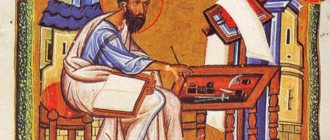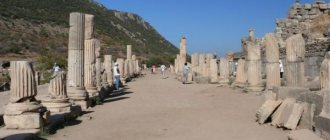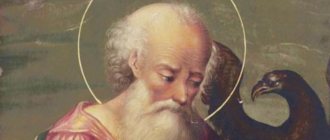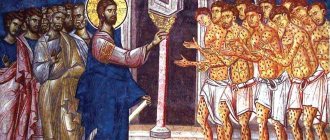Geneva Bible Commentaries: 1 Corinthians 13
13:1-3 By using hyperbole (exaggeration), Paul convincingly argues that gifts are useless if they are used without love. “Tongues of men” is probably the gift of speaking in foreign tongues (Acts 2:4-11; “tongues of angels” is most likely a hyperbole (along with the expressions “I know all mysteries” and “I can move mountains”). The expression “ I will give my body to be burned” in some ancient manuscripts looks like this: “I will give my body that I may boast,” which can be taken as an indication of Paul’s complete dedication to his ministry in anticipation of praise from God on the day of Christ (Phil. 2:16).
13:4-7 Paul describes love not as an emotion, but as an expression of it in action. By personifying love, he talks about how those who love act. The entire description presupposes Christ Himself. It can also be said that these verses are a rebuke to the Corinthians, whose behavior did not meet the requirements of love.
13:5 He thinks no evil. Another translation: “does not keep track of evil.” One who loves does not focus on the evil that others do to him, and does not plot evil himself.
13:8 Love never fails. This statement allows Paul to contrast love, which always abides (v. 13), with spiritual gifts, which will cease.
prophecies... tongues... knowledge. Paul probably mentions these three points as examples of spiritual gifts that have a temporary, earthly meaning. Paul lists only these three gifts because they have the function of revelation, which will also cease with the close of the New Testament era (v. 10&N).
13:10 perfect. The context (especially v. 12) strongly suggests that the apostle here has in mind the Second Coming of Christ as the consummating event of God's plan of redemption. Compared to what believers will receive then, the present gifts are partial and therefore imperfect.
13:12 Then I will know, even as I am known. Perhaps because the Corinthians worshiped knowledge (see 8:1N), Paul concludes by emphasizing the incomplete nature of our present knowledge.
The most excellent way (1 Corinthians 13:1-13).
← 1 Corinthians 12 • →
Commentaries on Chapter 13 of 1 Corinthians
The multidimensionality of biblical words gives room for interpretation. 5 most detailed interpretations given
- Theophylact of Bulgaria;
- John Calvin;
- Matthew Henry;
- Alexander Lopukhin;
- John MacArthur.
Theophylact of Bulgaria argued that only love can make a person mature
Theophylact of Bulgaria - a Byzantine, archbishop, interpreted the Bible kindly, very cordially.
Theophylact of Bulgaria analyzes the chapter truly philologically (that is, word-loving).
It finds internal connections of a short text and shows contrasts:
- angelic tongues (that is, the most perfect languages) - ringing copper (a sound that does not carry meaning);
- move mountains, all mysteries, all knowledge, all faith are nothing;
- all the property, burning - no benefit.
Theophylact of Bulgaria refers to the Greek language, comments on the nuances of the translation and selects a series of synonyms to clarify what love is. Since love is infinite, then by filling ourselves with it, we will be able to survive death and continue to live in a new way, when knowledge is complete and our very nature changes.
Theophylact here also finds connections with the first part:
- As a child he spoke the tongues of angels;
- Thought like a child - the gift of prophecy;
- He reasoned like a child - knowledge;
And only love can take you out of infancy, that is, to a new level. There, faith and hope will no longer be needed, since there will be nothing to be saved from, there will be no need to resist evil, but love will endure even after.
John Calvin says that the most powerful thing we have is faith
John Calvin, a Protestant, the founder of Calvinism, strongly criticized the official church and canonical Catholic translations of the Bible.
John Calvin begins with the last sentence of the previous chapter:
“And I show you an even more excellent way.”
Calvin believes that this line was mistakenly left out of chapter 13 and should be returned here.
Whatever we do, whatever godly deeds we commit, if we do it not out of love (for God, for His word, for our neighbor), but for some other motive, then everything we have done has absolutely no value:
- Do you speak all human and even angelic languages? It's nonsense if you don't have love.
- Do you work miracles? Without love they are empty.
- Are you giving away money? Useless without love.
- Are you sacrificing yourself? Without love - for what?
Calvin deciphers the duties of love (1 Cor 13: 4-8), clarifying the meaning of words with multifaceted translations from Greek, and also argues in some places with the translations of Erasmus and the papists (breaks them to smithereens).
At the end there is a thought about our imperfection, incomplete knowledge and lack of understanding of what will happen ahead. The highest thing that is now available to us is faith, hope and love, and the most worthy thing is love, and the strongest is faith (this free reinterpretation is proven by quotes from other places and is more or less consistent with biblical lines).
Matthew Henry said that the main strength is love, not faith
Matthew Henry is an English commentator on the Bible of the nineteenth century.
Matthew Henry, unlike Jacques Calvin, is convinced that the main force is still love, not faith. He devotes a lot of space to a detailed analysis of the properties of love, examines the listed signs from all sides and is very enthusiastic. He longs for the promised “later,” when we will begin to see clearly and know fully, when there will be only love in the world and no evil, troubles and disappointments.
Alexander Lopukhin said that love is a thread along which you can move to another life
Alexander Pavlovich Lopukhin is an academician and biblical scholar of the last century. He began educating Russians about the Bible from his student days; his works are highly valued by the Church.
Alexander Pavlovich Lopukhin notes the gradation of the gifts of the Holy Spirit: tongues - the gift of prophecy - secrets - knowledge - life. Reach the last point - and still without love it is nothing.
A.P. Lopukhin examines in great detail the 15 properties of love (1 Corinthians 13: 4-8) and gives interesting cultural explanations:
- About two types of love: αγάπη (agape) and έρως (eros). In the Bible - about the first, and the second - carnal, passionate;
- about a mirror in ancient times, which was dull, worse than a muddy stream, so the original “mirror” was replaced in translation with “dull glass”.
He summarizes: prophecies will cease, gifts will end, but faith, hope and love will remain forever. There will be a transition from infancy to maturity - but love will survive everything, and love is the thread along which you can pass into another life.
John F. MacArthur talks about love in the historical and literary sense
John Fullerton MacArthur is an American Protestant, Doctor of Divinity, and still enlightens Christians around the world through books and speeches.
Poeticizes the chapter about love, approaching it both from a historical point of view (an excursion into the life of the mercantile Corinthians) and from a literary one. Agape love, so rare in Greek literature compared to eros (romantic) love and philia (friendly) love, is best described in the Bible.
This is ideal love, Love with a capital letter, eternal and indestructible, and how to make it like this is written in just 4 passages (1 Corinthians 13: 4-7). Moreover, this love is active, it is described by verbs (what it does and what it does not do). It turns out that for true love it is not enough to just passively feel, the movements of the soul are important.
MacArthur also states that chapter 13 must be understood in conjunction with chapters 12 and 14, which also deal with spiritual gifts. While the gifts are desirable and significant, which Paul talks about in great detail in the following chapters, what matters is not what gifts you have.
The main gift is love, it is given to everyone, and woe to the one who does not develop it, even if outwardly he is superior to everyone.
>1 Corinthians chapter 13







